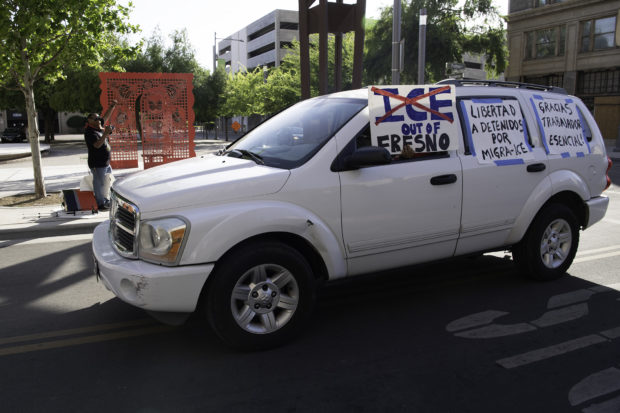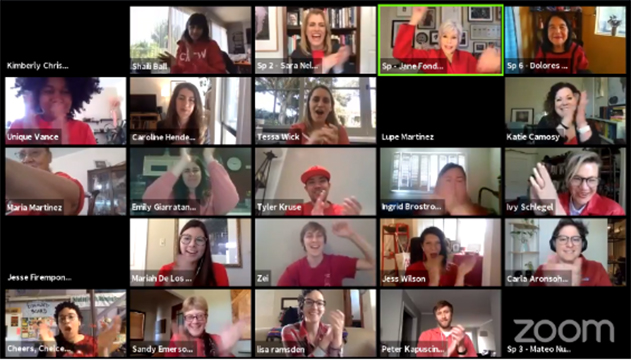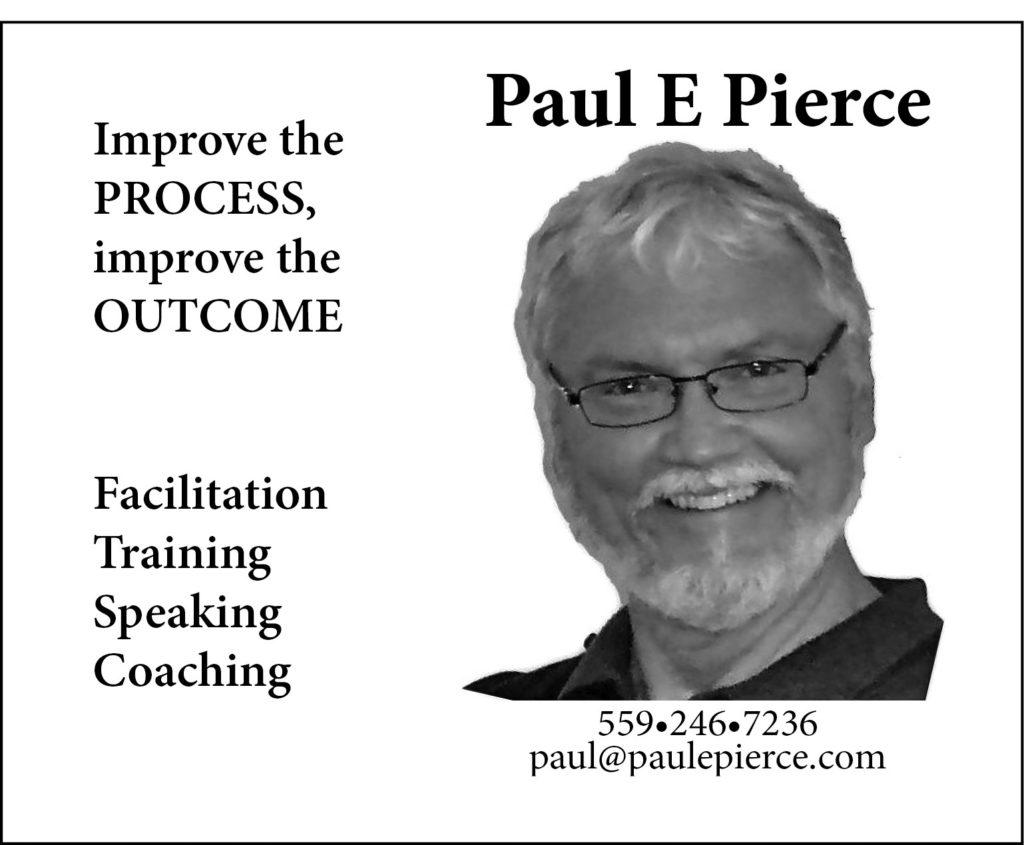
By Stan Santos
On May 1, members of the Fresno community celebrated the International Day of Workers’ and Immigrants’ Rights in a new and innovative way. It would be a significant milestone in the long tradition of May Day observations in the Valley.
Fresno immigrants’ rights activists were determined to support workers and immigrant families while simultaneously overcoming apprehension and fear in the face of a deadly pandemic. It was a unique event in the era of the novel coronavirus or Covid-19.
The May 1 Coalition, or Coalicion Primero de Mayo, started planning the 2020 Immigrants’ Rights March as it has each year for more than two decades. Meetings began in early February and were attended by several community groups, legal advocates and individuals. Plans, permit applications and fees were submitted to the City of Fresno, with routes and hours detailed.
Just as endorsements were finalized and participants listed on flyers and announcements, something happened that nobody could have prepared for. On March 19, Governor Gavin Newsom announced the statewide order to “shelter-in-place”; the City of Fresno issued similar orders the day before, but implementation started early morning of March 19.
Many activists supported the safety measures that were meant to protect the public. However, the guidelines still allowed hiking, bicycling, visiting parks and walking dogs. People could travel to certain jobs and buy food and household necessities, including liquor.
The Essential Worker
The pandemic and ensuing measures had an immediate impact on the community as schools, stores and agencies closed. Economic and social life came to a standstill; fear and uncertainty ruled the day. But the movement for immigrants’ and workers’ rights could not afford to pause, for a new challenge suddenly appeared in the form of the “essential worker.”
Between the institution of home sheltering and May 1, important legislative relief or “bailout” bills were passed that included increases in unemployment benefits and direct payments to households. The CARES Act provided benefits that would help many working and unemployed families and individuals.
However, it also mandated that the Federal Emergnecy Management Agency (FEMA) reverse the practice in past emergencies of distributing benefits to households that include documented and undocumented family members. Under CARES, any household that includes an undocumented family member would be entirely excluded from cash relief.
While undocumented workers and their families were denied assistance, they were considered “essential workers” and vital to the maintenance of large sectors of the economy. In the Central Valley, up to 70% of the agricultural labor force working in the fields and packing houses remains undocumented. The same is true in many of the meat and poultry processing plants, not only in the Valley but also throughout the United States.
Suddenly, the nation learned that several million workers who were targets of racist attacks by the Trump administration and lived under the constant threat of deportation were “essential” to the provision of food, manufactured goods and services. With no assistance in the event they contract Covid-19, they would be forced to choose between going to work and sheltering in place.
If they choose to work in unsafe conditions in the packing sheds and slaughterhouses, they could lose their lives while infecting their coworkers and, potentially, their families.
Rural Communities at Risk
On April 28, President Donald Trump announced that he would use the Defense Production Act (DPA) to compel meat processing plants to remain open amid the coronavirus pandemic. He stated to the media, “We’re going to sign an executive order today, I believe, and that’ll solve any liability problems.” His statement revealed that the DPA would not only force food production but also protect the industry from the consequences of their inadequate safety provisions.
As the numbers of infections and deaths rose, the public quickly became aware of the gaps in medical care and supplies throughout the United States. Central Valley communities already are known for having the poorest populations in the country, particularly children living in poverty.
These communities also have the poorest health indicators across the spectrum. According to the 2019 Community Health Needs Assessment (St. Agnes Medical Center), Fresno, Madera, Tulare and Kern counties routinely have higher ratios of patients to physicians. For example, there are more than 1,500 people for each primary care physician in Fresno County and only one community health center per 40,000 population.
Air quality is one of the biggest concerns in this region, with Fresno, Kings and Madera counties having much higher emergency department visits than the rest of California. Fresno County has twice the state average of asthma hospitalizations among children 0–17 years. For these reasons, advocates consider these communities predisposed to increased suffering from the effects of Covid-19.
The Caravan
On May 1, more than 30 vehicles met at the Mercado Mexico in downtown Fresno. There, the participants donned masks and other protective gear and attached signs to their vehicles demanding “Legalization for Essential Workers,” “Federal Assistance for Immigrants,” “ICE Out of Fresno” and “Thank You Doctors.” At 5 p.m., the Coalition launched the Caravan in Support of Essential Workers.
The May 1 Caravan, with horns blaring, wound through downtown, passing the historic Free Speech plaque at Mariposa and Fulton, the ICE detention facility on L Street, City Hall and the Fresno County Jail. In another unique element, the “virtual march” videotaped segments at each location with participants from the Caravan creating an electronic memorial dedicated to the actions of that day.
The Caravan ended in front of the Fresno City Hall at about 7 p.m. with a brief celebration of the action. They were joined by the Brown Berets and a group of young socialists who also had protested in front of the Fresno County Jail at noon. Various news media covered the event with interviews and overall positive coverage.
While conservative protesters flaunt protective measures and divert public attention from the mishandling of the pandemic, the 2020 May 1 Caravan in Support of Essential Workers calls for increasing protections, testing and benefits for all affected workers and families.
At the time of the drafting of this article, the United States was nearing 90,000 deaths due to Covid-19. Fresno County has almost 1,200 Covid-19 infected persons with 16 deaths. The city of Fresno has 554 cases, followed by Selma with 120, Sanger with 96, Reedley with 72 and Mendota with 42.
The Central Valley Meat plant in Hanford has 182 cases, with 115 workers from Kings County, 51 from Tulare and 16 from Fresno. Ruiz Foods in Dinuba reports 107 Covid-19 infections with 85 workers from Tulare and 22 Fresno residents. Pitman Farms in Sanger, Foster Farms, Cargill, Warmerdam and Amazon are all sites with Covid-19 infections.

The Virtual Rally
For the first time in its history of public manifestation, the Coalición Primero de Mayo por los Derechos de los Immigrants organized a virtual rally happening simultaneously with a caravan to celebrate immigrants who are essential workers. For the virtual rally, which lasted one hour and 45 minutes, presentations were broadcast from 13 grassroots elders and young artists, cultural organizers and immigrants’ rights activists representing organizations such as CHIRLA, Centro Binacional para el Desarrollo Indigena Oaxaqueño, SIREN and the United Farmworkers. Local artists and poets Aidee Medina, Miguel Villegas and Francisco Duarte also took part in the event.
The virtual rally took us to the highest point of the learning curve as we experienced moving community organizing and public engagement from physical spaces to online platforms.
This year, May Day and its history is as relevant as ever amid the Covid-19 pandemic. It was necessary to gather community members and organizers from different organizations to demand that essential workers are being treated as such. This pandemic has exposed the fragility of our economy without migrant, low-wage workers who in turn are exploited and left out of federal resources.
Advertising

As the May Day Coalition in Fresno, we set out to create a space where we bring awareness to the current community conditions we are facing and although we were limited to the ways we could gather, we virtually bridged people together in hopes to inspire self-advocacy, awareness, solidarity and, most important, community.
Our manifestation was a statement of dedication to our communities; it is necessary we make it known that even amid a pandemic, we will not stand for unfair treatment of our community. We will continue to fight alongside our indigenous, women, migrant, workers and immigrants everywhere to ensure fair treatment and equitable allocation of public resources. To the workers and migrants all across the Valley, we stand with you.
Organizing a May 1 virtual rally will stay as a memorable experience that happened not without technological and communication challenges. Nevertheless, these challenges were not an obstacle for testing a new way of community engagement. Organizing a live virtual rally was a new exercise and opened new possibilities for activism.
The audience has responded positively. Many have expressed that the virtual rally was informative, inspirational and engaging, which is great to hear because that was the goal in the first place. This experience also served as a reminder of the importance of having realistic expectations and keeping in mind the technical limitations that some rural communities face.
As the organizers of the virtual rally were learning, they were also in charge of training the presenters entering into a new platform of public expression. Our hope is that the people in our community see that a pandemic does not stop us from uplifting the voices of those who Covid-19 has affected the most and inspiring action for social change.
By the time this article is published, the United States will surpass 100,000 deaths and the states will mostly be “open for business” with low testing rates and no proven vaccine or therapeutic treatment. And the “essential worker” will become the “disposable worker.”
(Author’s note: Myrna Matinez Nateras, Minerva Mendoza and Sarai Ramos Gonzalez contributed to this story.)
*****
Stan Santos is an activist in the labor and immigrant community. Contact him at alianzadefresno@gmail.com.
